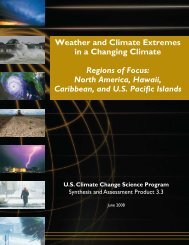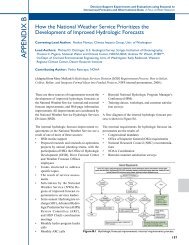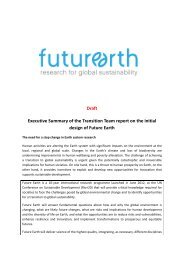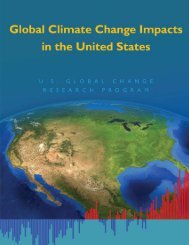Book 2.indb - US Climate Change Science Program
Book 2.indb - US Climate Change Science Program
Book 2.indb - US Climate Change Science Program
- No tags were found...
Create successful ePaper yourself
Turn your PDF publications into a flip-book with our unique Google optimized e-Paper software.
The U.S. <strong>Climate</strong> <strong>Change</strong> <strong>Science</strong> <strong>Program</strong> Chapter 5Box 5.3. High-Latitude Terrestrial FeedbacksIn recent decades, the Arctic has witnessed startling environmental change. The changes span many facets of the arcticsystem including rapidly decreasing sea-ice extent, melting glaciers, warming and degrading permafrost, increasing runoffto the Arctic Ocean, expanding shrub cover, and important changes to the carbon balance (Serreze et al., 2000; Hassol,2004; Hinzman et al., 2005). The observed environmental trends are driven largely by temperatures that are increasingacross the Arctic at roughly twice the rate of the rest of the world (Serreze and Francis, 2006). If the arctic warming continuesand accelerates, as is predicted by all global climate models (Chapman and Walsh, 2007), it may invoke a number offeedbacks that have the potential to alter and possibly accelerate arctic and global climate change. If the feedbacks operateconstructively, even relatively small changes in the Arctic could conspire to amplify global climate change. Continued environmentalchange, especially if it occurs rapidly, is likely to have adverse consequences for highly vulnerable arctic and globalecosystems and negative impacts on human activities, including costly damage to infrastructure, particularly in the Arctic.The Arctic can influence global climate through both positive and negative feedbacks (Fig. 5.15). For example, sea-ice retreatreduces surface albedo, enhances absorption of solar radiation, and ultimately leads to greater pan-Arctic warming.Large-scale thawing of permafrost alters soil structural (thermokarst) and hydrologic properties (Jorgenson et al., 2001)with additional effects on the spatial extent of lakes and wetlands (Smith et al., 2005; Riordan et al., 2006), runoff to theArctic Ocean, ecosystem functioning (Jorgenson et al., 2001; Payette et al., 2004), and the surface energy balance. Warmingis also expected to enhance decomposition of soil organic matter, releasing carbon to the atmosphere (a positive feedback)(Zimov et al., 2006) and also releasing nitrogen which, in nutrient-limited arctic ecosystems, may prompt shrub growth(a negative feedback due to carbon sequestration) (Sturm et al., 2001). This greening-of-the-Arctic negative feedback mayitself be offset by a positive radiative feedback related to lower summer and especially winter albedos of shrubs and treesrelative to tundra (Chapin et al., 2005), which promotes an earlier spring snowmelt that among other things affects soiltemperature and permafrost (Sturm et al., 2001).The future of the Arctic as a net sink or source of carbon to the atmosphere depends on the delicate balance betweencarbon losses through enhanced soil decomposition and carbon gains to the ecosystem related to the greening of the Arctic(McGuire et al., 2006). Irrespective of the carbon balance, anticipated increases in methane emissions mean that the Arcticis likely to be an effective greenhouse gas source (Friborg et al., 2003; McGuire et al., 2006).The Arctic is a complex and interwoven system. On the basis of recent evidence of change, it appears that many of theseprocesses are already operating. Whether or not the positive or negative feedbacks will dominate is a critical questionfacing climate science. In a recent paper reviewing the integrated regional changes in arctic climate feedbacks, McGuire etal. (2006) conclude that the balance of evidence indicates that the positive feedbacks to global warming will likely dominateover the next century, but their relationship to global climate change remains difficult to predict, especially since much ofthe research to date has considered these feedbacks in isolation.198






